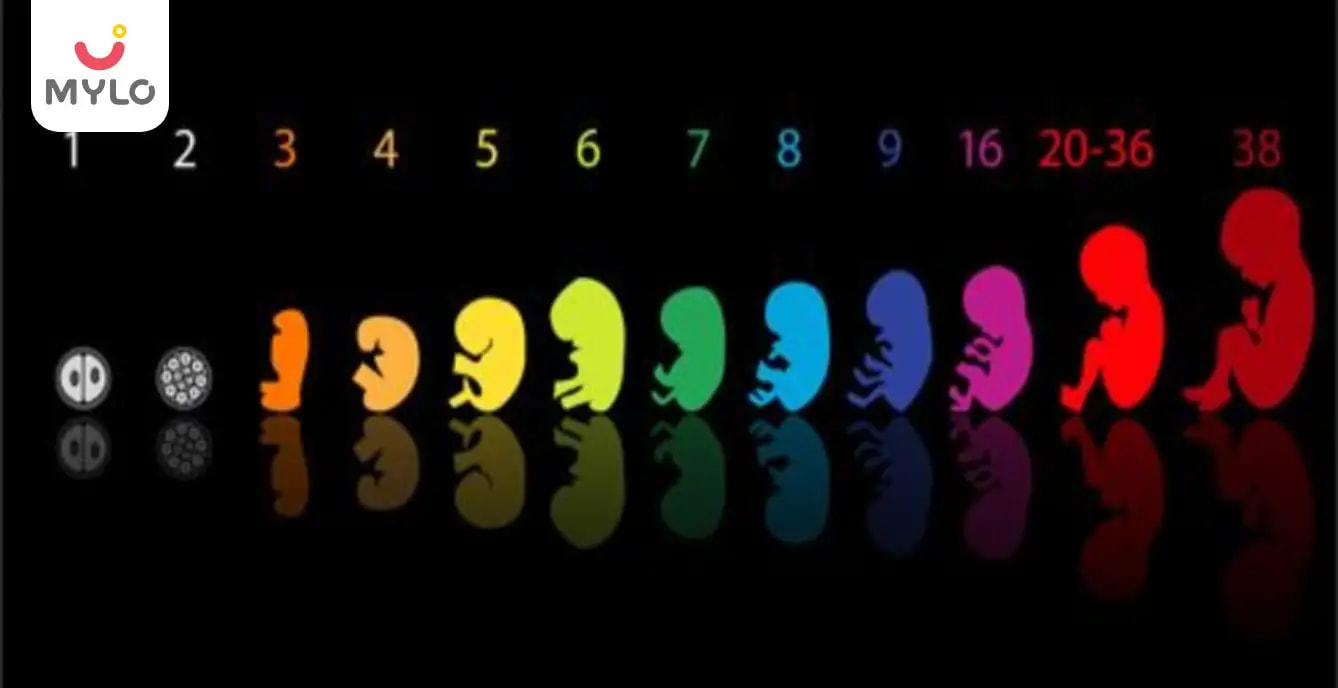Home

Growth & Development

Is your baby fat? Find out here if he is healthy or not
In this Article

Growth & Development
Is your baby fat? Find out here if he is healthy or not
Updated on 3 November 2022



Medically Reviewed by
Dt. Mansi Goyal
Specializes in Critical Gestational Diabetes, PCOS Patients - BSC| MSC (Home Science, Food & Nutrition)
View Profile

Thinking of a baby, we often imagine plump and bouncy cheeks ( Woogly-woogly-wosh), the ones to cuddle and kiss all day long. You might have heard mommies referring to their child as "HEALTHY" (Nazar na lage) when they are overweight or obese. Remember, ladies' being overweight is never healthy and could be the underlying cause of many diseases.
While plump babies have followed eyeballs, it is best to monitor the weight and height gain ratio. Most of the time, parents are worried when their baby's weight gain is not optimum, whereas they tend to ignore if the baby's weight gain is more than the normal range. However, rapid weight gain can be a symptom of serious medical issues and should not be ignored.
When to worry whether you have a obese baby?
During regular checkups and vaccination days, doctors monitor the height and weight of the baby. The parents should enquire whether the weight gain is within normal limits and if the doctor suggests rapid weight gain, then carefully monitor in the coming months. The doctors also evaluate BMI or Body mass Index, which is more accurate and will help you remove doubts.
The child's growth chart has regular updates regarding height and weight, and BMI can be easily calculated using these two parameters. The BMI percentile measures your child's growth compared to other kids of the same age group. The following is the percentile chart that will help you track if your child's weight gain is an issue of concern.
- Underweight: BMI less than the 5th percentile.
-
Healthy weight: BMI in the 5th to 84th percentile
-
Overweight: BMI between 85th to 94th percentile
-
Obese: BMI in the 95th percentile or above
The growth in toddlers occurs in spurts. Therefore, a single visit measurement can't be a cause for concern. However, if your baby's BMI ranges in the 85th percentile or higher, your pediatrician will ask for a follow-up visit. If the BMI falls in the overweight or obese category for two consecutive visits, then there is a problem.
Health concerns for infant obesity
Do you know that excess weight is a concern for babies? Harvard University experts state that obese babies in the first two years face health problems in childhood and adulthood. 2018 reviews also state that obese babies become overweight children and adults. Obese children or adults risk developing chronic diseases such as heart disease, blood pressure, type 2 diabetes, etc.
Maintaining healthy baby weight.
Your little bundle of joy means the world to you, but that doesn't imply that you overfeed them to express your love. Overloading meals with butter scoops or dessert now and then may feel good to your child, but it is not healthy. As a smart mom, you must know the difference between actual health and our so-called "HEALTHY" definition. The following tips will help you to find the right balance and help your child to maintain a healthy weight:
- Whenever your baby cries, they are not hungry
Imagine when you have difficulty burping, and someone suggests eating a sandwich. Your baby might be crying for any reason ranging from needing to burp, pee or poop, feeling tired, or just being bored. Please don't feed them until it's time for their next meal or until they show signs of hunger.
-
Always prefer breastfeeding over formula feeding.
Breastfeeding is the best option for all infants below six months. Don't fall prey to myths like breastfed babies are leaner and formula-fed babies are chubbier.
- Opt for healthy and nutritious solid food items
The daily nutritional requirements of your baby need a combination of carbohydrates, fats, proteins, vitamins, and minerals. Add fruits and vegetables to your child's meal so that your child can eat and say yummy in their cute baby voice.
Keep your baby moving.
Please help your child to move their limbs by helping them to exercise while giving them a massage. Also, let your kids roll and crawl at the appropriate age, as it will help them have a balanced metabolism and strengthen their muscles.
Keep them away from sugary candies.
Kids have a strong affinity for candies and chocolates. So keep this sugary stuff away from your baby to prevent cavities and maintain a healthy weight.
Summary
Feeding healthy food and beverages and staying active is crucial for maintaining a healthy baby weight. The parent's responsibility is to play an active role in the baby's diet chart. Obesity in babies is a matter of concern as they develop health issues later in life. Hope this information is adequate for parents to maintain a healthy weight for babies. Always follow healthy practices.
References
Roy, S. M., Spivack, J. G., Faith, M. S., Chesi, A., Mitchell, J. A., Kelly, A., … Zemel, B. S. (2016). Infant BMI or Weight-for-Length and Obesity Risk in Early Childhood. PEDIATRICS, 137(5), e20153492–e20153492. https://doi.org/10.1542/peds.2015-3492
Taveras, E. M., Rifas-Shiman, S. L., Belfort, M. B., Kleinman, K. P., Oken, E., & Gillman, M. W. (2009). Weight Status in the First 6 Months of Life and Obesity at 3 Years of Age. PEDIATRICS, 123(4), 1177–1183. https://doi.org/10.1542/peds.2008-1149
Zhang, J., Himes, J. H., Guo, Y., Jiang, J., Yang, L., Lu, Q., … Shi, S. (2013). Birth Weight, Growth and Feeding Pattern in Early Infancy Predict Overweight/Obesity Status at Two Years of Age: A Birth Cohort Study of Chinese Infants. PLoS ONE, 8(6), e64542. https://doi.org/10.1371/journal.pone.0064542





Medically Reviewed by
Dt. Mansi Goyal
Specializes in Critical Gestational Diabetes, PCOS Patients - BSC| MSC (Home Science, Food & Nutrition)
View Profile


Written by
Ravish Goyal
Official account of Mylo Editor
Read MoreGet baby's diet chart, and growth tips

Related Articles
Related Questions
Hello frnds..still no pain...doctor said head fix nhi hua hai..bt vagina me pain hai aur back pain bhi... anyone having same issues??

Kon kon c chije aisi hai jo pregnancy mei gas acidity jalan karti hain... Koi btayega plz bcz mujhe aksar khane ke baad hi samagh aata hai ki is chij se gas acidity jalan ho gyi hai. Please share your knowledge

I am 13 week pregnancy. Anyone having Storione-xt tablet. It better to have morning or night ???

Hlo to be moms....i hv a query...in my 9.5 wk i feel body joint pain like in ankle, knee, wrist, shoulder, toes....pain intensity is high...i cnt sleep....what should i do pls help....cn i cosult my doc.

Influenza and boostrix injection kisiko laga hai kya 8 month pregnancy me and q lagta hai ye plz reply me

Related Topics
RECENTLY PUBLISHED ARTICLES
our most recent articles

Diet & Nutrition
What are the Top 10 Foods Every Woman Should Avoid During Her Pregnancy?

Illnesses & Infections
All That You Need to Know About Monkeypox: Symptoms, Prevention, Transmission & Treatment
Scans & Tests
Are you a first-time mother? Here's everything you need to know about ultrasounds during pregnancy

Conception
Ovulation disorders and their medications

Third Trimester
Here's a complete guide on lightening or baby dropping.

Water Break
Are you aware of these top 10 signs and symptoms of Labor?
- Top 10 Maths Puzzles for Kids to Keep Them Busy
- Top 10 Most Searched Proverbs For Kids
- Top 10 Most Popular Birthday Games for Kids
- Parenting Tips
- 6-Month-Old Baby's Food Chart: Quantity and Routine
- What are the Implications of Non Stress Test for Your Baby?
- Screening for Down Syndrome in Babies
- What Are the Causes and Different Stages of Prolonged Labor (Delayed Birth)?
- Top 10 Action Series on Netflix
- 15 Best Underrated Movies on Netflix
- Top 10 Most Trending Movies on Netflix
- 10 Best Crime Series on Netflix
- 10 Most Popular Series on Netflix
- 5 Most Popular International Movies on Netflix


AWARDS AND RECOGNITION

Mylo wins Forbes D2C Disruptor award

Mylo wins The Economic Times Promising Brands 2022
AS SEEN IN

- Mylo Care: Effective and science-backed personal care and wellness solutions for a joyful you.
- Mylo Baby: Science-backed, gentle and effective personal care & hygiene range for your little one.
- Mylo Community: Trusted and empathetic community of 10mn+ parents and experts.
Product Categories
baby carrier | baby soap | baby wipes | stretch marks cream | baby cream | baby shampoo | baby massage oil | baby hair oil | stretch marks oil | baby body wash | baby powder | baby lotion | diaper rash cream | newborn diapers | teether | baby kajal | baby diapers | cloth diapers |








